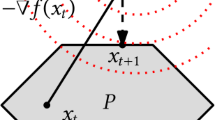Abstract
We generalize a smoothing algorithm for finite min–max to finite min–max–min problems. We apply a smoothing technique twice, once to eliminate the inner min operator and once to eliminate the max operator. In mini–max problems, where only the max operator is eliminated, the approximation function is decreasing with respect to the smoothing parameter. Such a property is convenient to establish algorithm convergence, but it does not hold when both operators are eliminated. To maintain the desired property, an additional term is added to the approximation. We establish convergence of a steepest descent algorithm and provide a numerical example.
Similar content being viewed by others
References
Mayne D.Q., Polak E., Trahan R.: An outer approximations algorithm for computer-aided design problems. J. Optim. Theory Appl. 28(3), 331–352 (1979)
Drezner Z., Thisse J.-F., Wesolowsky G.O.: The minimax–min location problem. J. Reg. Sci. 26(1), 87–101 (1986)
Polak E., Royset J.O.: Algorithms for finite and semi-infinite min–max–min problems using adaptive smoothing techniques. J. Optim. Theory Appl. 119(3), 421–457 (2003)
Bertsekas D.: Constrained Optimization and Lagrange Multiplier Methods. Athena Scientific, Nashua (1996)
Xingsi L.: An entropy-based aggregate method for minimax optimization. Eng. Opt. 18, 277–285 (1992)
Xu S.: Smoothing method for minimax problems. Comput. Optim. Appl. 20(3), 267–279 (2001)
Polak E., Royset J.O., Womersley R.S.: Algorithms with adaptive smoothing for finite minimax problems. J. Optim. Theory Appl. 119(3), 459–484 (2003)
De Bruijn, N.G.: Asymptotic methods in analysis, 2nd edn. Bibliotheca Mathematica, vol IV. North-Holland, Amsterdam (1961)
Parpas P., Rustem B., Pistikopoulos E.N.: Linearly constrained global optimization and stochastic differential equations. J. Global Optim. 36(2), 191–217 (2006)
Hwang C.: Laplace’s method revisited: weak convergence of probability measures. Ann. Probab. 8(6), 1177–1182 (1980)
Polak, E.: Optimization. Applied Mathematical Sciences, vol. 124. In: Algorithms and consistent approximations. Springer, New York (1997)
Bertsekas D.: Nonlinear Programming. Athena Scientific, Nashua (1999)
Author information
Authors and Affiliations
Corresponding author
Rights and permissions
About this article
Cite this article
Tsoukalas, A., Parpas, P. & Rustem, B. A smoothing algorithm for finite min–max–min problems. Optim Lett 3, 49–62 (2009). https://doi.org/10.1007/s11590-008-0090-9
Received:
Accepted:
Published:
Issue Date:
DOI: https://doi.org/10.1007/s11590-008-0090-9




